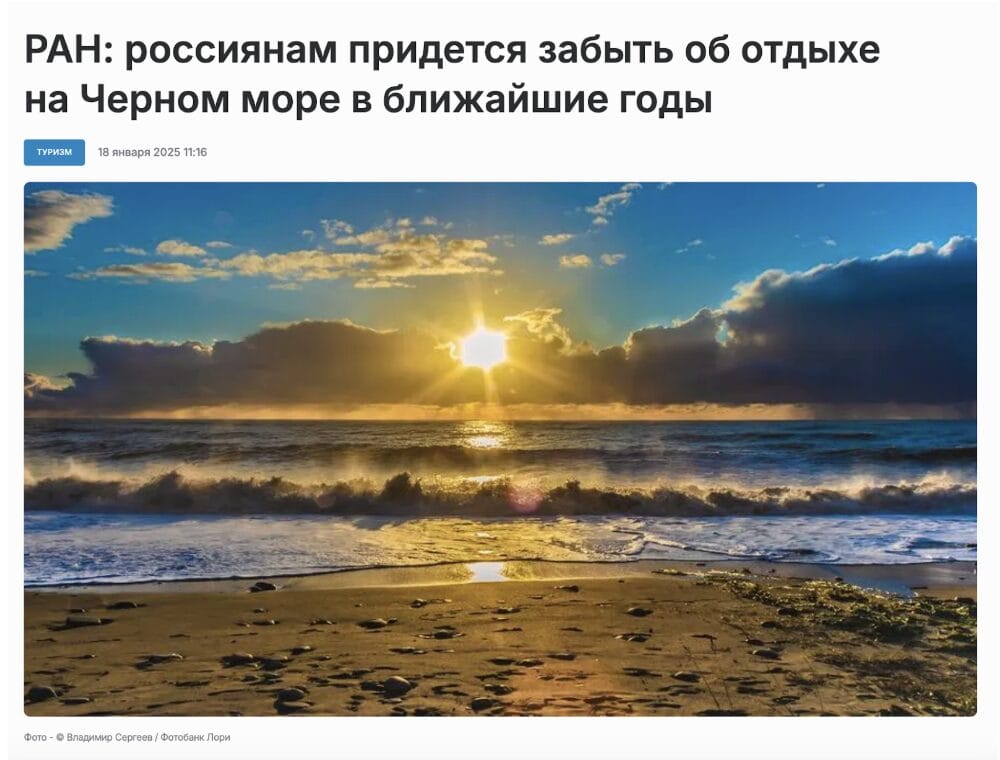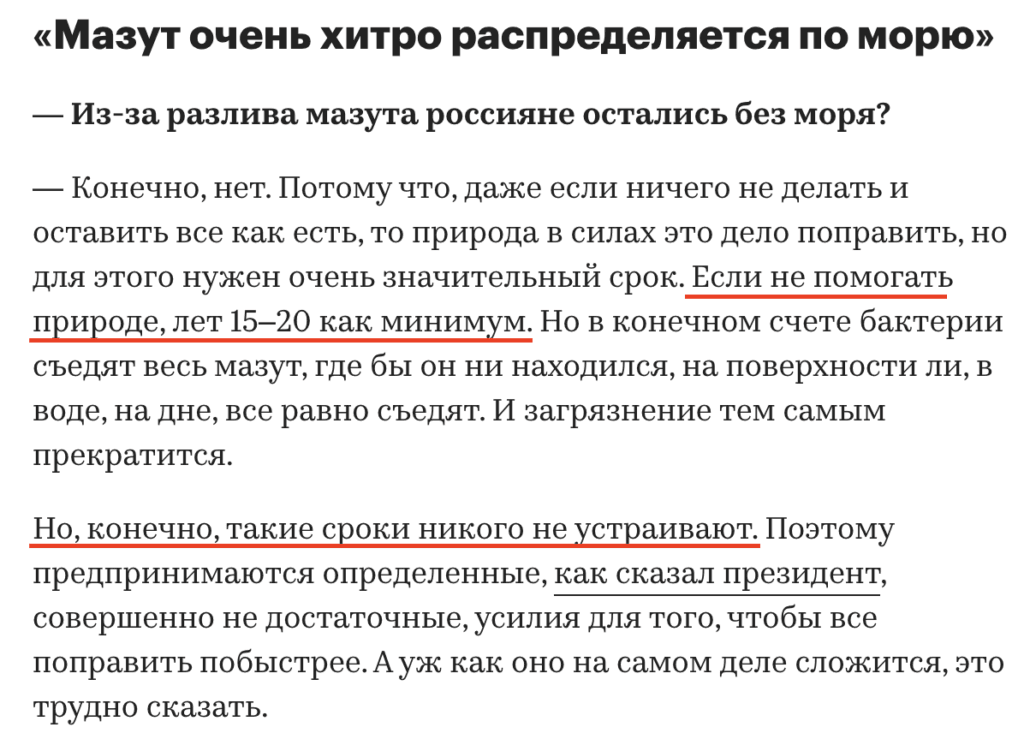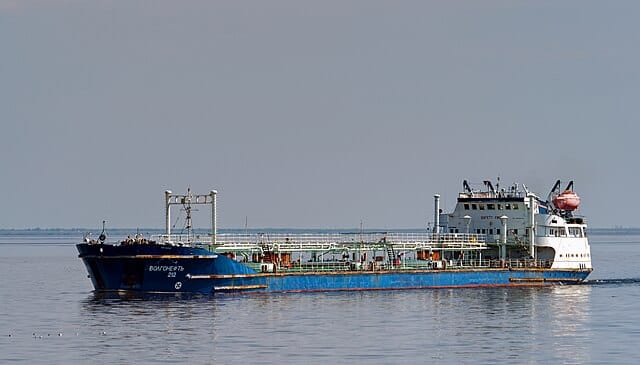In January 2025, news spread widely across the Internet that experts from the Russian Academy of Sciences considered holidays on the Black Sea coast to be hazardous to health for the coming decades. We have verified the authenticity of these publications.
On January 18, a statement allegedly made by the scientific director of the Institute of Water Problems of the Russian Academy of Sciences began to actively spread on the RuNet. According to it, due to the recent fuel oil spill, safe swimming in the Black Sea is impossible for the next 15–20 years, until the ecosystem of the reservoir is completely restored. The resources that published notes about the ban on swimming also clarify: allegedly, RAS experts urged not to trust tour operators who “will lure tourists to resorts,” since swimming in the Black Sea can lead to chemical burns and allergies.
The news was published by Telegram channels “Live broadcast • news"(867,000 views at the time of writing this analysis), "Dvach"(448,000), "Pozdnyakov 3.0"(424,000), "Moscow Live" (423,000), "Bad News 18+"(252,000), "Moscow today"(218,000) and others. This information also appeared in the media Kaluga news, RIAMO, 56 orb.ru, "Regional Ryazan newspaper", "Kaluga without z format" And "Championship"

In mid-December 2024 in the Kerch Strait due to a strong storm suffered the wreck of two Russian tankers: Volgoneft-212 and Volgoneft-239. The ships were carrying about 9,200 tons of fuel oil, some of which spilled into the waters of the Black Sea. Initially to the Ministry of Natural Resources countedthat 4,000 tons of oil products got into the water, but subsequently the Ministry of Transport named the figure is 2400. Fuel oil quickly spread, polluting the coastal areas of the Krasnodar Territory and Crimea. Toxic substances from wrecked Russian tankers carried out and on the coast of Odessa, and birds smeared in oil products found and in Georgia.
Sources that disseminated information about a ban on swimming in the Black Sea in the coming years refer to the words of a certain expert from the Russian Academy of Sciences. There is no name in the publications, but some indicate the position - scientific director of the Institute of Water Problems. This post is in the academy takes Doctor of Economic Sciences, Corresponding Member of the Russian Academy of Sciences Viktor Ivanovich Danilov-Danilyan. In January 2025, Danilov-Danilyan gave an interview about the fuel oil spill in the Black Sea "To the merchant" And RBC. The period of 15–20 years, which is indicated by the resources that disseminated the information, is already mentioned in the first answer to the question of an RBC journalist. The expert explains that during this period the sea can cleanse itself if no additional effort is made, and this will happen due to bacteria that absorb fuel oil. Danilov-Danilyan separately emphasizes that such deadlines do not suit anyone, so additional efforts are needed to solve the problem. However, the scientist does not state that during all these years swimming in the sea will be unsafe for human health.

In addition to the ban on swimming in the Black Sea, resources - also citing an expert from the Russian Academy of Sciences - disseminate information that swimming in polluted water can lead to chemical burns and an allergic reaction. Part of the RBC interview is indeed devoted to the future tourist season on the Black Sea coast. The journalist asks questions about how safe it is to swim and sunbathe on the beach and what forecasts the expert can give. However, even in this case, Danilov-Danilyan states that any predictions are premature. In his opinion, the condition of the beaches at the end of May can only be judged in the future, but now it is obvious that restoration work will affect all aspects of beach recreation. Pollution is distributed unevenly: in some areas of the coast the situation is worse, while in other places, just a few hundred meters away, its traces may be minimal.
As for the safety of swimming, Danilov-Danilyan explains that fuel oil in water does not dissolve, but forms clots. Contact with them is truly undesirable: fuel oil remains on the skin and, if not removed in time, can cause burns or allergic reactions. However, due to the unevenness of pollution, it cannot be said that any swimming in the Black Sea will lead to such consequences. None of the interviews that Danilov-Danilyan has given since the fuel oil spill says that Russians will have to completely give up vacationing on the coast for the next decades or even a year. Same opinion adheres to and Sergei Ivanov, special representative of the President of the Russian Federation on environmental issues, ecology and transport: “Not a single responsible person today can say when the accident will be completely eliminated.” Ivanov’s answer concerned the tourist season already this year; he also did not announce any ban for decades.
Every year Rospotrebnadzor checks beaches for compliance with sanitary and epidemiological standards. This year's preliminary assessment promised to hold until March 1st. So far, the agency has not announced the closure of beaches, nor has it provided recommendations on acceptable pollution standards in swimming areas. Head of the Ministry of Natural Resources Alexander Kozlov reportedthat the authorities plan to begin work on restoring the beaches only at the end of this year, and to complete them by the beginning of the 2026 season. He explained such deadlines by his reluctance to disturb vacationers. The next day he addedthat the authorities should bring the beaches to standard conditions by the beginning of this summer season.
Fuel oil spill in December 2024 Danilov-Danilyan named the largest environmental disaster in Russia since the beginning of the 21st century. Despite its scale, this is not the first such case in the Kerch Strait. November 11, 2007 severe storm brought to the wreck of several ships, including the tanker Volgoneft-139, which broke apart, pouring out more than 1200 tons of fuel oil at sea. Since the accident, several studies have been conducted on the environmental impact of the incident. A UN program analysis published a year after the storm showed: “Oil will remain a source of pollution in the future if it is not removed,” however, as stated in the text, no noticeable biological effects were found. At that time, access to the Black Sea was not limited. Despite the fact that the 2024 accident is almost twice as large as the previous one, there is no reason to say that in this case the danger of swimming in the sea will increase so much that it will lead to the complete closure of beaches. In addition, the Black Sea washes the shores of six countries: Russia, Ukraine, Georgia, Turkey, Bulgaria and Romania. To date, no official body of these countries has also announced the closure of the Black Sea resorts in the coming years.
This is not the first panic rumor about the danger of the Black Sea for people since the accident. On December 18, three days after the spill, publications circulated on Telegram channels and social networks that allegedly the coast of Anapa would be closed to tourists for ten years. Then posts about this were published by Telegram channels “Drain Rat"(255,000 views), "Rhymes and punches"(187,000), "Yuri will be Dud"(39,000), etc. Some publications about closing the Black Sea for ten years on TikTok received millions of views. However, at the end of December 2024, and to date, this information has not been officially confirmed.
Thus, not a single RAS expert called on Russians to completely abandon vacations on the Black Sea in the next 15-20 years. Corresponding Member of the Russian Academy of Sciences Viktor Danilov-Danilyan stated that during this period the reservoir will completely clean itself if human intervention in this process is excluded. The fuel oil spill occurred a month ago, and so far no official source has made any statements about the danger of holidays on the Black Sea coast in the near future.
Cover photo: Wikimedia Commons
- Meduza. The fuel oil spill in the Black Sea is an event whose scale few could immediately assess
- Is it true that in Spain you have to pay to throw away organic waste?
- Is it true that they are planning to shoot the film “The History of the Black Sea” in Ukraine?
If you find a spelling or grammatical error, please let us know by highlighting the error text and clicking Ctrl+Enter.






